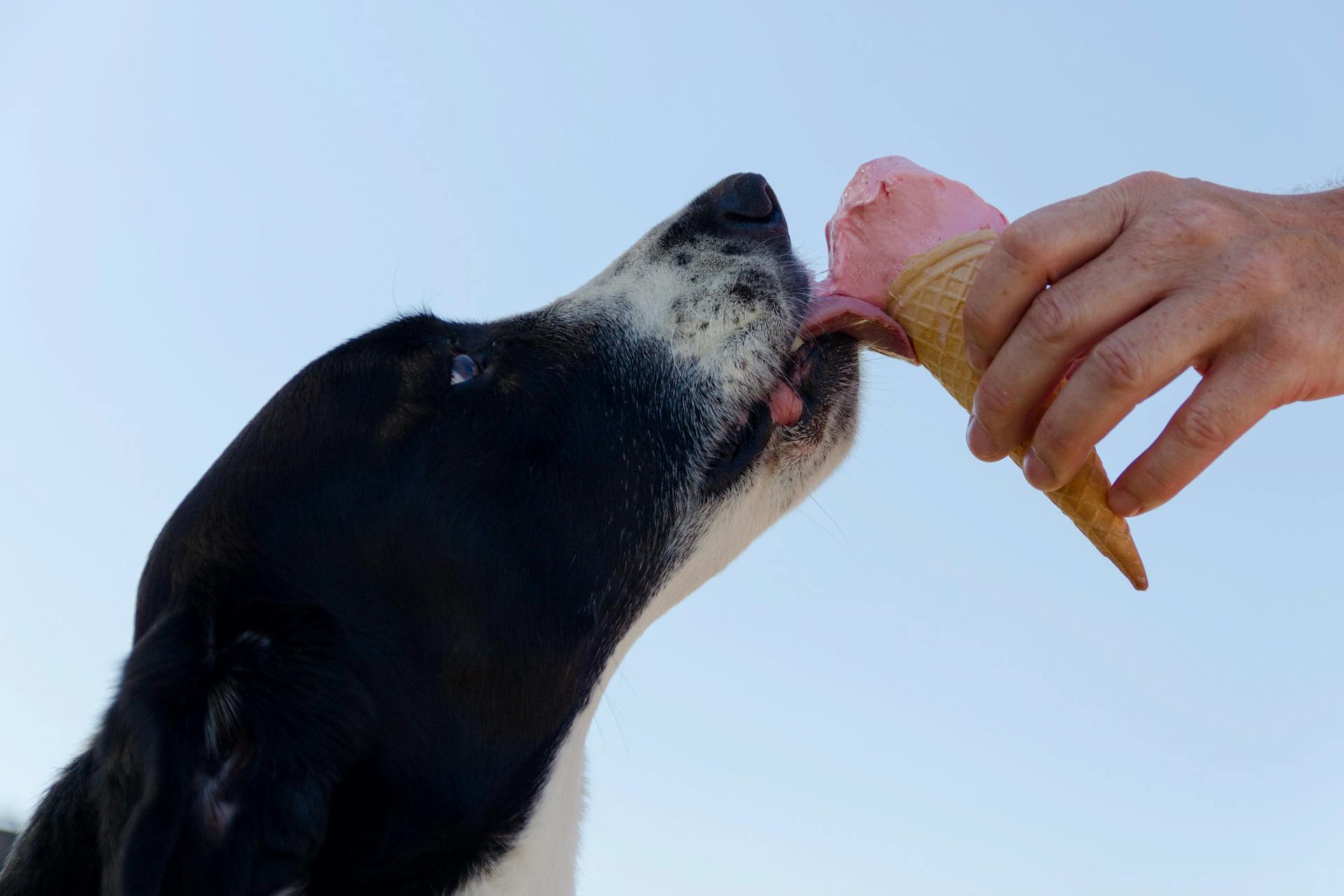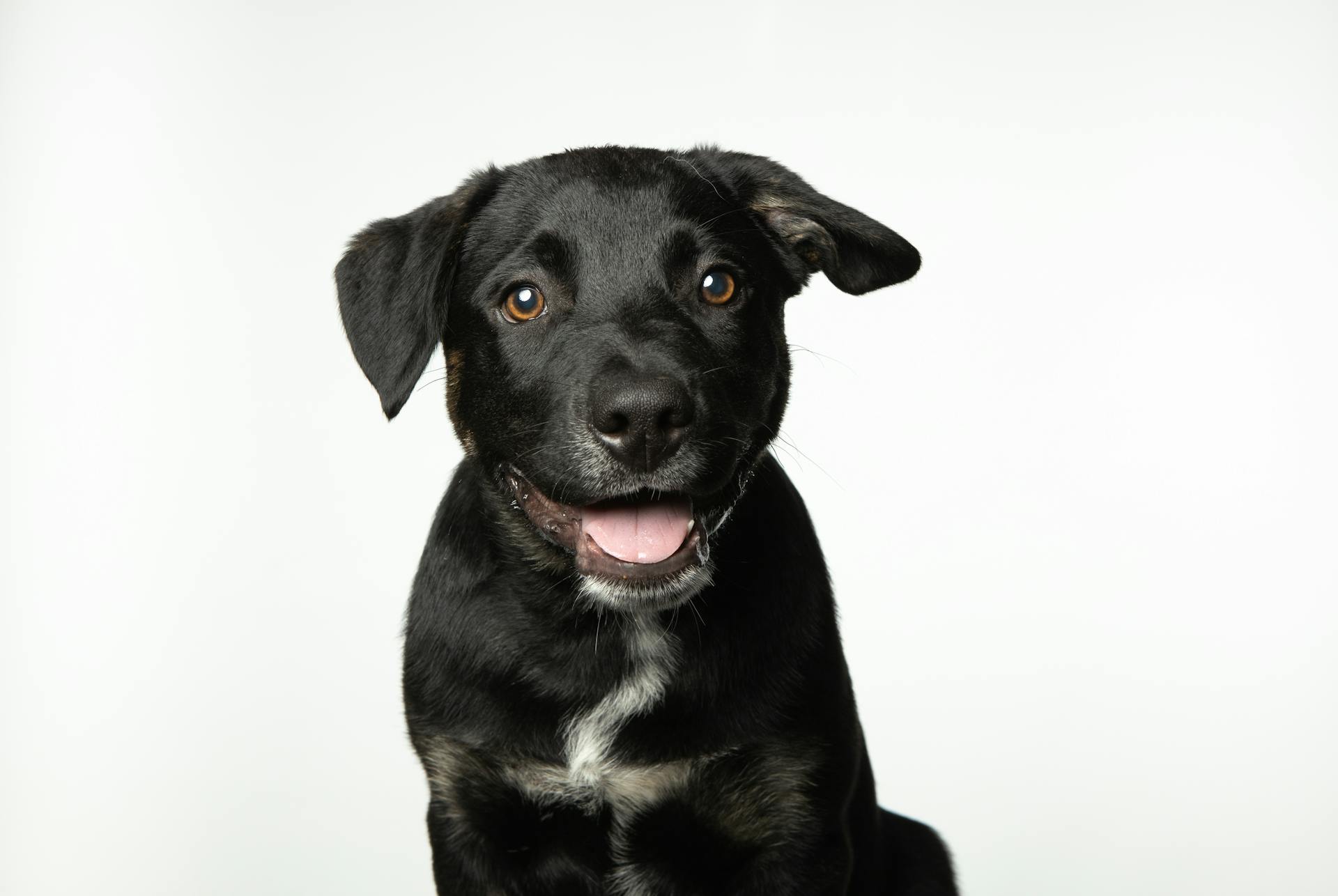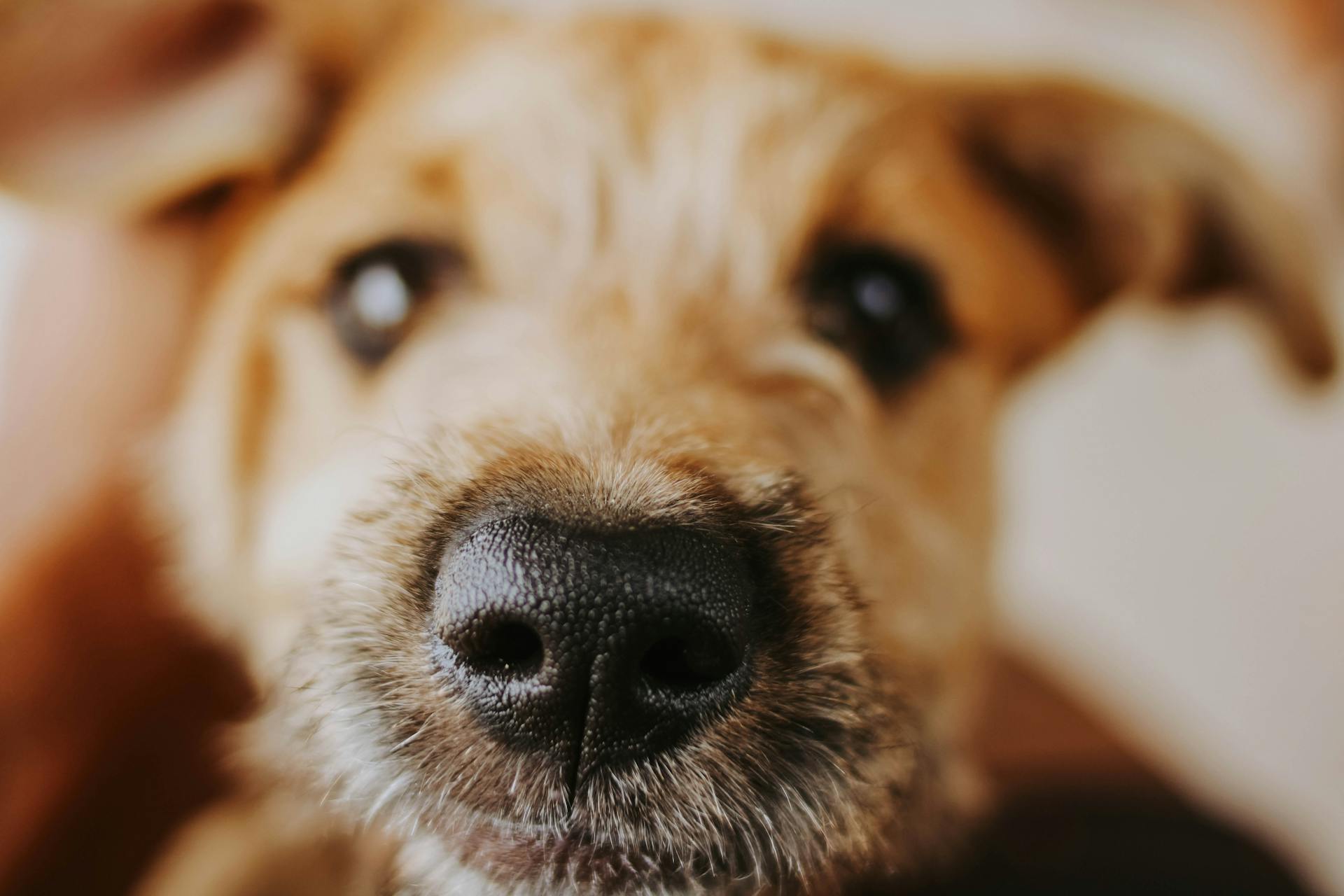
Dogs' gums bleeding when chewing toys can be a concerning issue for pet owners. This is because it can be a sign of underlying health problems, such as gum disease or tooth decay.
Some common causes of bleeding gums in dogs include poor dental hygiene, a diet lacking essential nutrients, and even genetics. For example, some breeds are more prone to gum disease due to their genetic makeup.
If your dog's gums are bleeding, it's essential to inspect their teeth and gums regularly to prevent further damage. This can be done by gently lifting their lips and examining their teeth and gums.
In severe cases, bleeding gums can lead to infections, which can spread to other parts of the body, such as the heart or liver.
Worth a look: Gum Disease in Chihuahuas
Causes of Gum Bleeding
Dogs gums bleeding can be caused by a variety of factors. Traumatic or injury-related bleeding gums can occur from chewing on bones, toys, or sticks.
Expand your knowledge: Health Dog Gums
Chewing on hard objects can lead to cuts or abrasions in the gums. This is especially true if your dog is prone to chewing on rough or sharp items.
Foreign bodies can also cause bleeding gums in dogs. If your dog is curious and likes to put everything in their mouth, they may ingest a foreign object that causes bleeding.
In some cases, bleeding gums can be a sign of a more serious issue. If your dog has ingested toxins, such as rat bait, it can disrupt their blood's ability to clot, leading to bleeding gums.
Poor oral hygiene can also contribute to bleeding gums in dogs. Just like humans, dogs need regular dental cleanings and brushing to prevent the buildup of bacteria and plaque.
Here are some common causes of bleeding gums in dogs:
- Traumatic or injury-related bleeding gums
- Foreign body penetration
- Ingestion of toxins
- Poor oral hygiene
- Inflammation resulting from systemic diseases
Inflammation from systemic diseases can also cause bleeding gums in dogs. These diseases can include parasitic, bacterial, or fungal infections, as well as various types of cancer.
Symptoms and Signs
If you notice your dog has been chewing on a toy and now has bleeding gums, it's essential to identify the symptoms and signs. Visible blood in the drool or on objects or surfaces is a clear indication.
Bleeding gums can start subtly, but there are some noticeable symptoms you should watch out for. Halitosis, or bad breath, may be the earliest and most noticeable symptom.
Swollen gums that are red or dark pink in color are another sign. You may also notice yellow or brown teeth, which can be loose or missing. Appetite changes and weight loss are also potential symptoms.
Here are some possible causes of bleeding gums in dogs:
- Trauma or injury from chewing various objects and toys
- Foreign body penetration from curious chewing
- Ingestion of toxins like rat bait
- Infection and inflammation from poor oral hygiene
- Inflammation from systemic diseases
Blood may appear in your dog's saliva, on chew toys, or on bowls. It can be bright red or dark and mixed with saliva. If you notice any of these signs, it's crucial to call your vet immediately.
Preventing Pet Periodontal Disease
Preventing periodontal disease in dogs is crucial to maintaining their overall health and preventing bleeding gums.
Daily toothbrushing is one of the best ways to prevent periodontal disease in dogs. You should brush your dog's teeth at least three times a week.
Start brushing your dog's teeth when they are a puppy, ideally around 6 months of age when they have their adult teeth in place. Brushing a puppy's teeth during teething can be painful and make them fearful of the process.
You can use dental wipes, oral rinses, dental chew toys, and prescription dental diets to help decrease plaque and gingivitis. Check the Veterinary Oral Health Council's list of approved products to see what you can use.
Some common causes of bleeding gums in dogs include periodontal disease, which can be treated with dental care ranging from a simple scale and polish to extractions or even periodontal surgery.
Expand your knowledge: Soft Food for Dogs with No Teeth
Dental Problems and Diseases
Dental problems can be a real concern for our furry friends. Periodontal disease is a common issue that can cause bleeding gums in dogs, especially when they're chewing on toys. This condition is caused by the buildup of plaque and tartar on the teeth, which can lead to inflamed gums and even tooth loss.
Bad breath is often one of the first signs of periodontal disease, so if your dog's breath is particularly pungent, it's worth taking a closer look. Gingivitis, the first stage of periodontal disease, can be reversible if caught early, but if left untreated, it can progress to more serious problems.
Some dog breeds are more prone to periodontal disease due to their genetic makeup or the shape of their mouth. Toy breeds and brachycephalic breeds, such as Pugs, are more susceptible to this condition. Regular dental cleanings and a healthy diet can help prevent periodontal disease, but it's essential to keep an eye out for symptoms like bleeding gums, bad breath, and difficulty eating.
Here are some common dental problems that can cause bleeding gums in dogs:
- Traumatic or injury-related bleeding gums from chewing bones, toys, or sticks
- Foreign body penetration causing bleeding of gums
- Ingestion of toxins that disrupt coagulation, such as rat bait
- Inflammation and subsequent infection from poor oral hygiene
- Inflammation resulting from systemic diseases
If you notice any of these symptoms, it's crucial to take your dog to the vet for a proper diagnosis and treatment. Regular dental care, including brushing your dog's teeth and providing dental chews or toys, can help prevent these problems and keep your dog's gums healthy.
Readers also liked: Do Dog Dental Chews Work
Dog Health and Injury
If your dog starts bleeding from the mouth due to a foreign object, such as a piece of bone or plastic, it's essential to remain calm and limit their activity. You should immediately call your veterinarian for guidance and prepare to transport your pet.
Regular dental check-ups can help prevent mouth bleeding in dogs. Schedule annual or bi-annual dental exams with your veterinarian to identify potential issues like plaque buildup, gum disease, or loose teeth.
To prevent mouth bleeding, implement a daily teeth brushing routine using a toothbrush and toothpaste specifically designed for dogs. You should also choose safe chew toys that are durable and suitable for your dog's size and chewing style.
Some common causes of mouth bleeding in dogs include foreign objects, cuts and scrapes, and dental issues. To minimize the risk of these issues, consider the following:
- Regular dental check-ups
- Daily teeth brushing
- Proper diet
- Safe chew toys
- Avoid hard treats
If your dog does experience mouth bleeding, it's crucial to seek professional veterinary care quickly.
Teething
Teething can be a challenging time for puppies, and one of the most common signs is bleeding gums. If your pup is still under eight months, you might see their gums bleeding due to teething. This phase only lasts a couple of months, and the bleeding will stop once the teething course is over. Teething toys can help relieve the problem, so it's a good idea to give your puppy some suitable teething toys to chew on.
Foreign Objects
Foreign objects can get caught between a dog's teeth, causing bleeding. This can happen with small pieces of bone that get stuck.
A dog may also ingest pieces of plastic or aluminum from chewing up containers or other objects. These objects can be pulled out easily in most cases.
However, there are rare occasions where the object is stuck too tightly and anesthetic is needed to remove it.
Dog Injury Care
If your dog starts bleeding from the mouth, remain calm and limit their activity.
Immediately call a veterinarian for guidance and prepare to transport your pet.
Quick action and professional veterinary care are crucial to effectively manage this situation.
Cuts and scrapes can cause bleeding from the gums, but in most cases, it will be okay in a couple of days.
However, you should still look out for possible infections and keep an eye on their gums until it fully heals.
If you notice any unusual objects lodged in your dog's mouth, safely secure them for the trip to the vet.
A gum biopsy may be needed if immune diseases or cancer are found.
Veterinary Advice and Care
If your dog starts bleeding from the mouth while chewing a toy, it's essential to remain calm and limit their activity. Immediately call your veterinarian for guidance and prepare to transport your pet.
You'll want to keep your dog quiet and avoid giving them food or water, as this could worsen the bleeding. It's also crucial to safely secure your dog for the trip to the vet and bring any dislodged teeth or unusual objects you find, along with any relevant health history.
The treatment for bleeding gums in dogs will depend on the cause, which may range from a simple cleaning to more involved procedures like extractions or surgical removal of a tumor. If the cause is periodontal in nature, your veterinarian will recommend veterinary dental care, which may include a scale and polish or more involved dental procedures.
For your interest: Can a Bug Bite Cause a Lump on a Dog
Veterinary Advice
Regular dental cleanings at your vet's office are crucial for maintaining your dog's oral health. Toy breeds should start getting their teeth cleaned at 1 year of age, while larger breeds can begin at 2 years old.
It's essential to practice good preventative oral health care, just like you would for your own teeth. By taking care of your dog's teeth now, you're preventing bigger problems in the future.
If your dog starts bleeding from the mouth, remain calm and limit their activity. Immediately call your vet for guidance and prepare to transport your pet.
Intriguing read: Vet Dogs Dog Treats
The treatment for bleeding gums in dogs will depend on the cause found for the condition. If the cause is purely periodontal in nature, your vet will recommend a dental cleaning or extraction.
Here are some common causes of bleeding gums in dogs:
- Periodontal disease
- Broken teeth
- Gingivitis
The prognosis of periodontal disease will depend on the stage, with stage 1 being gingivitis. Regular dental cleanings can help prevent periodontal disease and other dental problems.
If you're not already involved in some degree of routine oral hygiene, consult with your vet for recommendations and training on what to do.
Broaden your view: Von Willebrand Disease in Doberman Pinschers
Diagnosis
Diagnosing a problem with your furry friend can be a straightforward process, but it may also involve some more in-depth testing.
Your veterinarian will need a complete history of your pet's dietary regimen, oral hygiene measures, health history, and vaccinations, along with details about the bleeding gum symptoms you've noticed.
A physical examination will likely be the first step in the diagnostic process, and your veterinarian may order a series of blood tests to check for normal blood component values and the possibility of infection.
Your veterinarian may take tissue samples, as well as do urine and fecal testing, to help determine the cause of the bleeding gums.
Radiographic testing (x-rays), CT scanning, or MRI studies may be ordered if your veterinarian suspects an underlying systemic cause for the inflammation in the oral cavity.
To determine the primary cause of the bleeding gums, your veterinarian will consider the results of the testing and create a treatment plan focused on addressing the underlying issue, whether it's periodontal disease or another systemic problem.
Related reading: Does Wet Food Cause Diarrhea in Dogs
Frequently Asked Questions
How can I soothe my dogs bleeding gums?
For bleeding gums, try a warm salt water rinse or an oral gel containing aloe vera and eucalyptus oil to reduce swelling and soothe irritation. This can help calm your dog's gums and promote healing.
Why does my dog bleed from mouth when eating?
Bleeding from your dog's mouth while eating may be a sign of a minor dental issue or a more serious gastric problem, such as internal bleeding or a gastrointestinal issue. Check the color and texture of the blood to determine the severity of the issue.
Sources
- https://forevervets.com/blog/why-does-my-dogs-teeth-chatter
- https://www.linkedin.com/pulse/bleeding-gums-dogs-what-do-david-zheng
- https://wagwalking.com/condition/bleeding-gums
- https://outwardhound.com/furtropolis/health-wellness/my-dogs-gums-are-bleeding
- https://embassylakesanimalhospital.com/blog/dog-bleeding-from-mouth/
Featured Images: pexels.com


